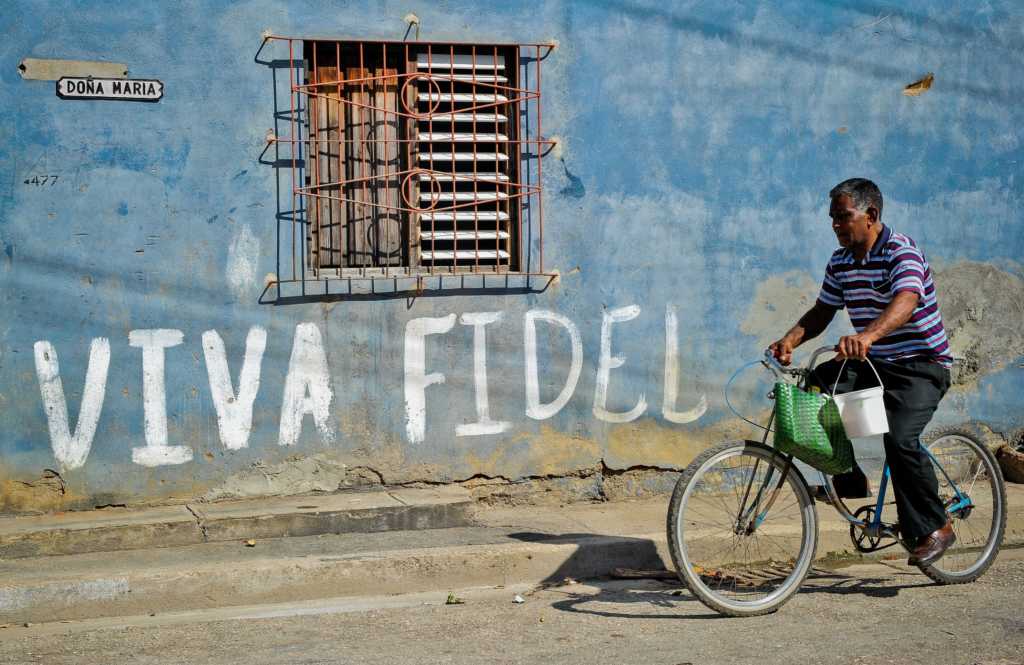Fidel Castro’s death sparked both praise and criticism from world leaders and exiled Cubans all over the globe.
Cuban Americans celebrated in the streets of Little Havana in Miami over the weekend after Castro’s brother, Raul Castro, announced the death of the longtime leader in a televised statement late Friday night. Castro was 90 years old when he died.
It's Saturday night in #LittleHavana and hundreds of Cuban-Americans are still outside Versailles, singing and celebrating #Castro's death. pic.twitter.com/GHtb2jlhbl
— Nick Thompson (@nickthompson) November 27, 2016
Texas Sen. Ted Cruz, whose father was born in Cuba, called Castro a “murderous tyrant and thug” while speaking on ABC’s “This Week” on Sunday. Cruz also criticized President Barack Obama, who offered condolences to Castro’s family and extended a “hand of friendship” to the Cuban people.
.@tedcruz on death of Fidel Castro: "It is thankful he is no longer with us." https://t.co/vPNDA9JeYq #ThisWeek https://t.co/GWqaiVSfhk
— ABC News Politics (@ABCPolitics) November 27, 2016
Florida Sen. Marco Rubio, also of Cuban descent, said Castro’s death does not equal freedom for Cuban people or justice for the democratic activists, religious leaders and his political opponents.
“The dictator has died, but the dictatorship lives on,” Rubio said in a statement. The Florida senator also criticized Obama’s statement for not mentioning the “thousands” Castro killed and imprisoned.
History will remember Fidel Castro as an evil, murderous dictator who inflicted misery & suffering on his own people pic.twitter.com/Y7207S6qVD
— Marco Rubio (@marcorubio) November 26, 2016
President Obama issued a pathetic statement on death of dictator #FidelCastro with no mention of thousands he killed & imprisoned. #Cuba
— Marco Rubio (@marcorubio) November 26, 2016
President-elect Donald Trump at first offered a simple reaction to Castro’s death on Twitter but later released an official statement, calling Castro a “brutal leader.” Cuba will emerge as one of the first foreign policy tests of Trump’s administration, experts say.
Fidel Castro is dead!
— Donald J. Trump (@realDonaldTrump) November 26, 2016
U.S. Rep. Illeana Ros-Lehtinen, the first Cuban-American to be elected to Congress, called Castro a “tyrant” who reigned over Cuba with an “iron fist.”
A tyrant is dead + a new beginning can dawn on the oppressed island of #Cuba.#Cuban ppl must b guaranteed #liberty, #democracy, #humanrights
— Ileana Ros-Lehtinen (@RosLehtinen) November 26, 2016
Ros-Lehtinen and her family fled Cuba when she was 8 years old. She criticized Canadian Prime Minister Justin Trudeau, who referred to the dictator as a “legendary revolutionary,” saying his remarks were a “sickening love letter.”
Please read my statement on the passing of former Cuban President Fidel Castro: https://t.co/vIYCZrJGfg
— Justin Trudeau (@JustinTrudeau) November 26, 2016
Several foreign leaders also issued statements on Castro’s death.
Pope Francis sent a telegram to Raul Castro offering prayers and expressing his sorrow for the Castro family and Cuban people, CNN reported.
U.K. Foreign Secretary Boris Johnson said Castro’s death “marks the end of an era for Cuba and the start of a new one for Cuba’s people.” Johnson called Castro a “historic” and “controversial figure.”
India Prime Minister Narendra Modi called Castro “one of the most iconic personalities of the 20th century” and a “great friend” to India.
Fidel Castro was one of the most iconic personalities of the 20th century. India mourns the loss of a great friend.
— Narendra Modi (@narendramodi) November 26, 2016
Mexican President Enrique Peña Nieto also called Castro a “friend” who “promoted a bilateral relationship based on respect, dialogue, and solidarity,” according to NBC News.
Syria President Bashar Assad praised Castro as well, saying his name will “live forever in the minds of generations and remain an inspiration for all people who aspire to achieve real independence and liberation from the yoke of colonialism and hegemony.”
Russian President Vladimir Putin called Castro a “true and reliable friend of Russia” and praised Castro for “establishing and developing Russian-Cuban ties.”
On Saturday, a nine-day morning period was announced to precede the days before Castro’s funeral on Dec. 4. Cuban flags were flown at half-staff, while public performances and sales of alcohol halted. Radio and television will broadcast patriotic and historical programming, according to state media.
Castro ruled Cuba for nearly five decades. While he defied a U.S. embargo that sought to dislodge him, he lived just long enough to see diplomatic relations between his country and the U.S. reestablished.
Finally got a copy of today's Granma. pic.twitter.com/9f2IGpR63E
— Patrick Oppmann CNN (@CNN_Oppmann) November 26, 2016
Castro almost caused a nuclear holocaust by allowing the Soviet Union to house nuclear bombs in Cuba in the 1960s. He also sponsored terrorism “wherever he could” and allied himself with “many of the worst dictators on earth,” according to the Washington Post.
The Cuban ruler was also responsible for thousands of executions and disappearances in Cuba and filled concentration camps and prisons at an “unprecedented rate,” while also condoning and encouraging torture and extrajudicial killings.
A vast majority of Cubans were impoverished as a result of Castro’s communist ideals. He forced nearly 20 percent of his people into exile, and thousands of Cubans lost their lives at sea while attempting to flee the island.
Castro’s body was cremated after his death. His ashes will be taken across the reverse route he took across the island of Cuba after seizing power in 1959 in the revolution.


